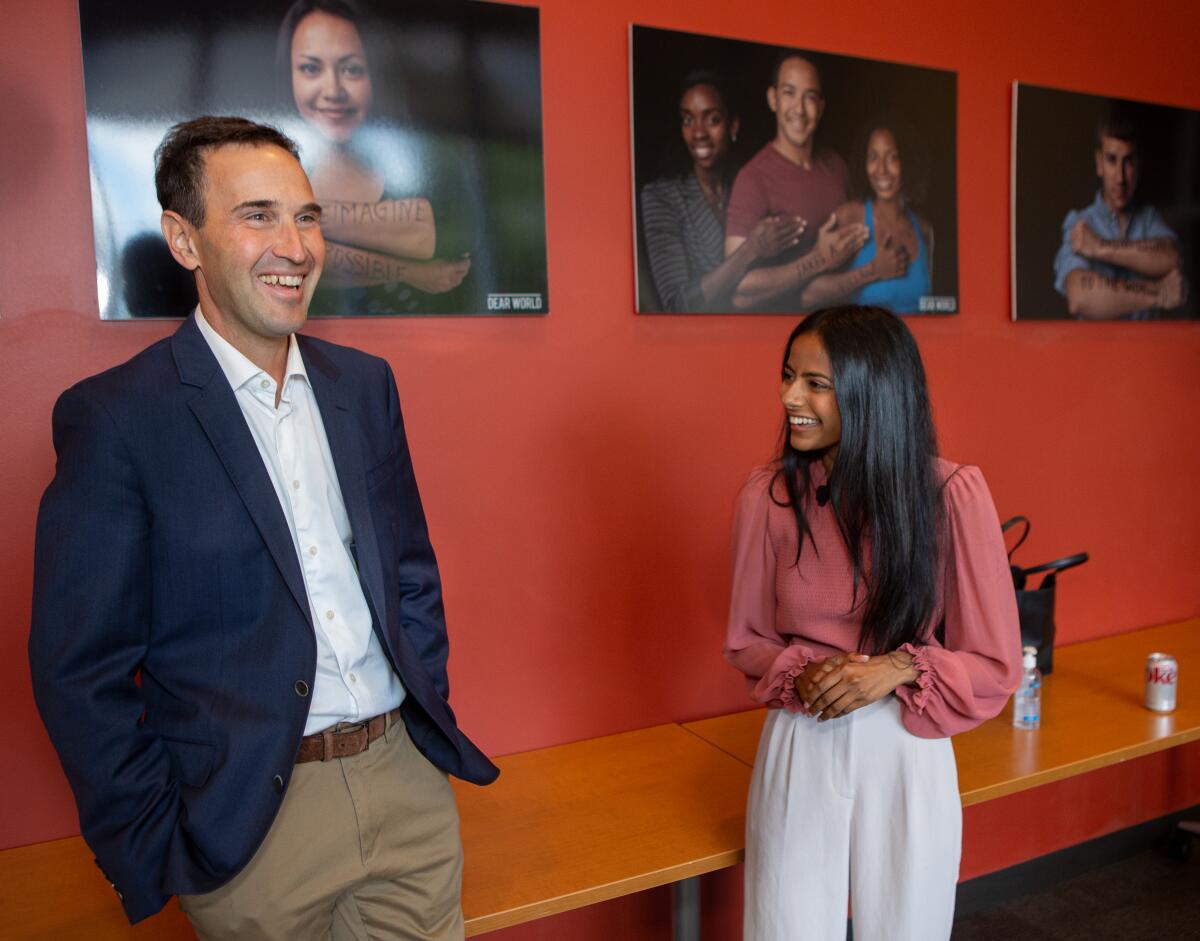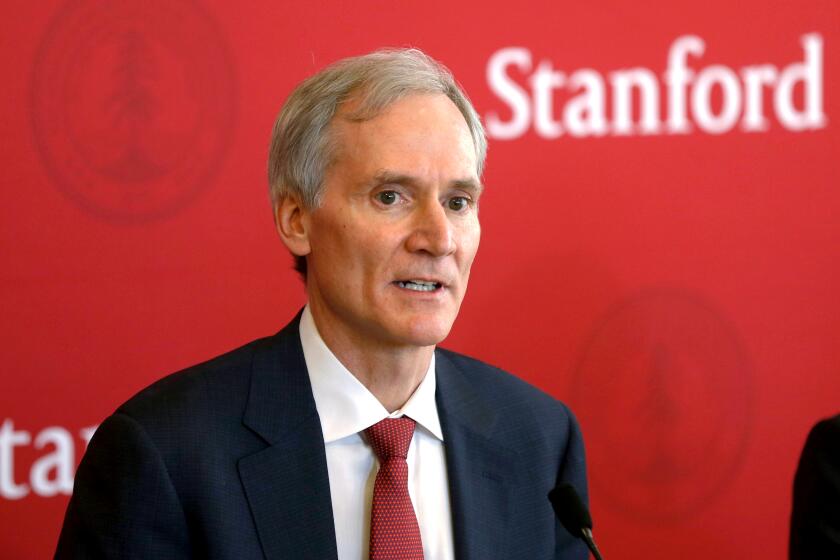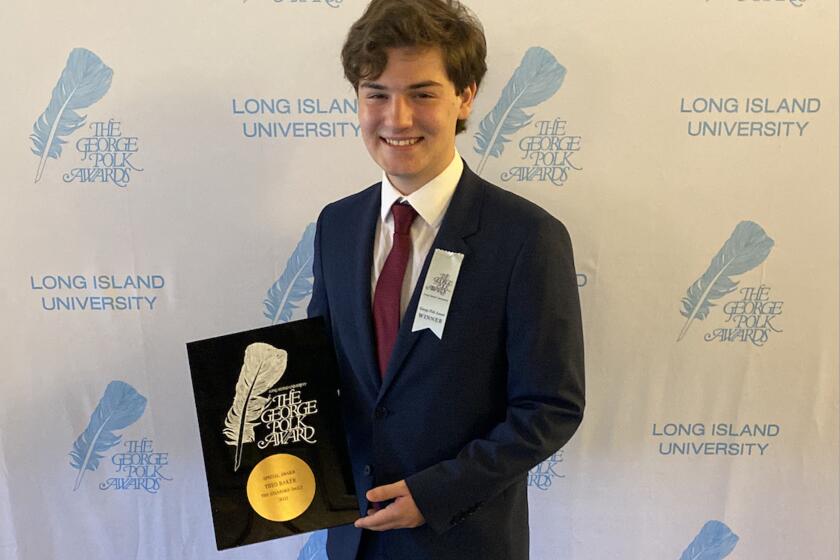Stanford names Jonathan Levin, business school dean, new president after leadership crisis

- Share via
Stanford University on Thursday named business school dean Jonathan Levin its new president, seven months after its former top leader resigned amid allegations of research misconduct.
Levin, a 51-year-old economist and Stanford alumnus who has led the business school for eight years, will take the helm at the Palo Alto campus Aug. 1.
He replaces Richard Saller, a professor of European studies who became interim president after Marc Tessier-Lavigne resigned in August amid research misconduct accusations.
After a review of allegations found flaws in his scientific articles, Stanford University President Marc Tessier-Lavigne said he will resign.
Levin will lead the university, one of the nation’s top-rated and wealthiest with a $36-billion endowment, at a turbulent time in higher education.
Nationwide, enrollment is declining, costs continue to skyrocket and many are questioning the value of a high-priced college degree. Public and private universities have been on the defense as conservative activists and politicians attack degree programs, classes and campus culture on race, gender and sexuality. Amid controversy over antisemitism, the presidents of Harvard and the University of Pennsylvania recently resigned.
In 2022, Stanford was roiled by a Stanford Daily report questioning Tessier-Lavigne’s neurobiology research. An independent panel later concluded that Tessier-Lavigne “did not personally engage in research misconduct” but failed multiple times to correct errors in published research and oversaw labs that had manipulated data. Announcing his resignation last summer, he said he was stepping down “for the good of the University.”
Last year, the university said it would return $5.5 million in donations from FTX, the bankrupt crypto exchange whose founder Sam Bankman-Fried was sentenced last week to 25 years in prison for fraud. Bankman-Fried is the son of two Stanford law professors.
Since the fall, campus conflicts have erupted over the Israel-Hamas war. In December, the U.S. Department of Education said it was investigating allegations of discrimination on the campus, such as antisemitism, after accusations that it violated Title VI of the Civil Rights Act. The act bans discrimination based on race, national origin, shared ancestry and ethnic characteristics. The investigation is one of several the federal government is conducting into U.S. universities in the wake of divisive campus protests since Oct. 7, as the line between freedom of speech and hate speech has become a hot-button debate.
Stanford faced intense pressure in the fall over its statements on the Israel-Hamas war. Two days after the Oct. 7 attack by Hamas in southern Israel, leaders said they were “deeply saddened and horrified by the death and human suffering” in the Middle East but did not name Hamas. By Oct. 11, a new statement condemned all “terror and mass atrocities” including the “deliberate attack on civilians this weekend by Hamas.”
In a Faculty Senate meeting in January, Levin suggested the university shouldn’t quickly wade into global issues. “I think it models the wrong thing for our students, and it actually undermines our basic educational mission … ,” he said. “We want them to think slowly, to hear from different people, to weigh things carefully, and we should model that and have the focus after an event in the world to be around listening and learning.”
In a statement Thursday, Levin said he would “strengthen our commitment to academic excellence and freedom; to foster the principles of openness, curiosity, and mutual respect; and to lead our faculty and students as they advance knowledge and seek to contribute in meaningful ways to the world.”
Levin earned undergraduate degrees in English and math from Stanford before studying at Oxford University and MIT. He joined the Stanford faculty in 2000. A former economics department chair, his research has focused on industrial organization and market design. In 2016, he became the dean of the Stanford Graduate School of Business after its leader resigned. In 2021, Levin was appointed to President Biden’s Council of Advisors on Science and Technology.
Levin will be the university’s 13th president.
“When I was an undergraduate, Stanford opened my mind, nurtured my love for math and literature, and inspired me to pursue an academic career,” Levin said. “In the years since, it has given me opportunities to pursue ideas in collaboration with brilliant colleagues, teach exceptional students, and bring people together to achieve ambitious collective goals around the university.”
Meet Theo Baker, the freshman reporter whose stories about suspect research kicked off a chain of events that led the president of Stanford to resign.
University administration also runs in his family. Levin is the son of former Yale University President Richard Levin.
Levin was selected by a 20-member committee that included professors, students, staff and trustees.
Jerry Yang, the chair of Stanford’s Board of Trustees who announced the search committee in September, said in a statement that Levin brings “a rare combination of qualities: a deep understanding and love of Stanford, an impressive track record of academic and leadership success, the analytical prowess to tackle complex strategic issues, and a collaborative and optimistic working style.”
“He is consistently described by those who know him as principled, humble, authentic, thoughtful, and inspiring,” Yang said. “We are excited about Stanford’s future under Jon’s leadership.”
More to Read
Sign up for Essential California
The most important California stories and recommendations in your inbox every morning.
You may occasionally receive promotional content from the Los Angeles Times.













